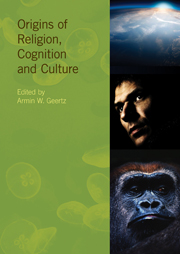Book contents
- Frontmatter
- Contents
- Contributors
- Introduction
- Part I EVOLUTIONARY SCENARIOS
- Part II COGNITIVE THEORIES
- 11 Cognition and meaning
- 12 Wittgenstein and the naturalness of religious belief
- 13 “Peekaboo!” and object permanence: on the play of concealment and appearance in cognition and religion
- 14 Yogācāra Buddhist views on the causal relation between language, cognition and the evolution of worlds
- 15 A resource model of religious cognition: motivation as a primary determinant for the complexity of supernatural agency representations
- 16 The recognition of religion: archaeological diagnosis and implicit theorizing
- 17 Religion and the extra-somatics of conceptual thought
- 18 Tools for thought: the ritual use of ordinary tools
- 19 Care of the soul: empathy in dualistic worldview
- 20 From corpse to concept: a cognitive theory on the ritualized treatment of dead bodies
- 21 Anthropomorphism in god concepts: the role of narrative
- Index
14 - Yogācāra Buddhist views on the causal relation between language, cognition and the evolution of worlds
from Part II - COGNITIVE THEORIES
- Frontmatter
- Contents
- Contributors
- Introduction
- Part I EVOLUTIONARY SCENARIOS
- Part II COGNITIVE THEORIES
- 11 Cognition and meaning
- 12 Wittgenstein and the naturalness of religious belief
- 13 “Peekaboo!” and object permanence: on the play of concealment and appearance in cognition and religion
- 14 Yogācāra Buddhist views on the causal relation between language, cognition and the evolution of worlds
- 15 A resource model of religious cognition: motivation as a primary determinant for the complexity of supernatural agency representations
- 16 The recognition of religion: archaeological diagnosis and implicit theorizing
- 17 Religion and the extra-somatics of conceptual thought
- 18 Tools for thought: the ritual use of ordinary tools
- 19 Care of the soul: empathy in dualistic worldview
- 20 From corpse to concept: a cognitive theory on the ritualized treatment of dead bodies
- 21 Anthropomorphism in god concepts: the role of narrative
- Index
Summary
Is causality, especially in human affairs like culture and religion, a one-way street, in which the shadow of the past pulls the puppet-strings upon which behaviour of the present helplessly hangs? Do cognitive approaches to religion ultimately lead to such a picture of hopeless determinism? As pictures go, this is a caricature, but it is a caricature we invite whenever we neglect some of the essential causal relations between cognition, culture and religion. Avoiding such critiques, though, requires a more explicitly interactive model of causality. We will outline one such model here by presenting a dialogue between ideas found in the cognitive sciences and those developed by the third- to fifth-century CE school of Indian Buddhist philosophy called Yogācāra, the “practitioners of yoga”. They developed a mode of analysis in which consciousness only occurs through the interaction between an organism and its environment. This enabled them to articulate a more nuanced understanding of the co-evolution of culture and consciousness, in which the cognitive processes of the past help construct the cognitive structures of the present, which then provide the foundation for the cognitive processes of the present that, in turn, affect the cognitive structures of the future. This feedback model provides a deeper understanding of the mutually constructive relation between culture and consciousness that seems particularly relevant to today's questions.
- Type
- Chapter
- Information
- Origins of Religion, Cognition and Culture , pp. 285 - 300Publisher: Acumen PublishingPrint publication year: 2013

